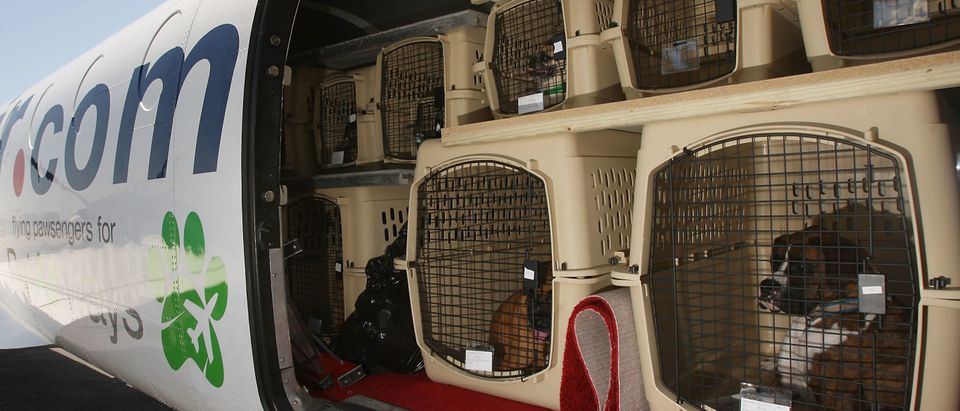Editor’s Note: The original version of this op-ed incorrectly stated, “IACUCs are established locally and must include an ethicist, a veterinarian and animal research expert.”
Upon further research, however, the author notes that not all IACUCs include an ethicist.
The statement has since been corrected. The Daily Caller apologizes for the error.
Despite smug edicts issued by the radical animal rights group People for the Ethical Treatment of Animals, its actions often negate its self-righteous preaching on the care of living creatures. PETA should never be an arbiter of what is moral.
When Hamas terrorists used flaming falcons and exploding donkeys to kill innocent Israeli civilians, PETA denounced them — but only about killing the animals. Although only Hamas favors exploiting animals in this disgusting fashion, PETA’s lack of concern for people is disturbing.
PETA has been further delegitimized after its activists were charged for criminal animal abuse and high kill rates in its “shelters” were publicized. In Virginia, where its kill rate from 2007-2017 averaged 95.3 percent, its cruelty investigations chief defensively quipped, “there are fates worse than euthanasia.”
From this utter lack of moral high ground and profound hypocrisy, PETA is now demanding American airline companies refuse to transport biomedical research animals.
Two separate sets of regulations govern what is becoming a major controversy. The Department of Transportation controls the movement of the lab animals, and a universe of strict federal standards govern their ethical treatment.
Although these rules complement each other, PETA — with its usual lack of concern for the law — is trying to drive a wedge between them, and some airlines are caving into its anti-human campaign.
The value of animal research cannot be understated. The guidelines governing it cannot be stricter. The legal requirement for airlines to transport research animals cannot be more clear.
The Animal Transport Act instructs airlines “to protect live animals (during) transport against injury, distress and suffering.” It also expressly sets provisions for compliance with the federal Animal Welfare Act.
The government has a wide set of multi-agency guidelines that demand humane treatment of laboratory animals. The Animal Welfare Act is administered through the Department of Agriculture and covers vertebrates and 90 percent of birds and fish.
Under the AWA, research facilities must establish oversight boards called Institutional Animal Care and Use Committees to review all research. These IACUCS are established locally and must include a veterinarian and animal research expert not connected to the research. No animal research can proceed without its written approval.
The U.S. Public Health Service has additional stringent lab animal protection that inform agencies, including the National Institutes of Health and the Centers for Disease Control, and also demand that “transportation of animals should be in accordance with AWA guidelines.”
Another layer of oversight is provided by the independent, non-profit Association for Assessment and Accreditation of Laboratory Animal Care International. Through protocols and reviews, it partners with federal agencies to accredit research institutions and regularly inspect them.
Each of these entities adheres to the “three R’s” of laboratory animal treatment: 1. Reduction in numbers of animals used; 2. Refinement of treatment to create the most humane environment possible; and 3. Replacement of animal testing with new technologies and options when available.
These entities protect animals that protect patients. And if the transportation of research animals comports with ATA and AWA guidelines, an airline cannot legally refuse transport.
Ironically, the first airline CEO to capitulate to PETA’s abusive tactics was United Airline’s CEO Carlos Munoz, a successful 2015 heart transplant recipient.
Without animal testing guiding the development of immunosuppressive drugs, the success of Mr. Munoz transplant surgery would be moot. Dr. Christiaan Barnard would not have achieved the first successful heart transplant in 1967 without first performing transplants on nearly fifty dogs.
Rabbits and mice have been instrumental in developing anti-rejection drugs and are now being humanely utilized to establish predictive rejection risk protocols.
Cancer deaths are declining and there would be no chemotherapy without mice. Genome mapping of dogs with cancer have led to a pill in development that reduces mast cell tumors. The estimated ten million Alzheimer’s sufferers in the United States benefit from brain mapping of other primates.
Is there anyone on any plane carrying a research animal who has not been affected in some way by heart disease, cancer or Alzheimer’s? If PETA chooses to care about animals more than people, that’s its choice. The question is whether CEOs of U.S. airline carriers will join them.
America loves animals. We adopt three million dogs or cats every year and 79 million families have a Rover or a Fluffy. We donated a total $305 million to just the Humane Society and ASPCA alone in 2016.
It’s time for Transportation Secretary Elaine Chao to enforce laws that require commercial planes to carry research animals and for airline carriers to make the ethical and humane choice. PETA and Hamas exploit God’s creatures; appreciating animals’ contributions to our health and life expectancies honors them.
Kerri Toloczko is a senior policy fellow at Institute for Liberty, a public policy organization dedicated to limited government, free enterprise and individual pursuit of the American dream.
The views and opinions expressed in this commentary are those of the author and do not reflect the official position of The Daily Caller.


